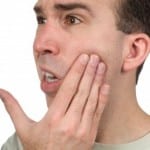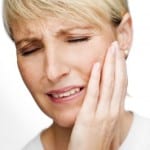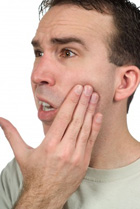 TMJ disorder, also known as TMD, is a term used to describe symptoms, which affect the temporomandibular joint; this is one of the busiest joints in the body and it is responsible for very important actions, such as opening and closing the mouth. You can feel the TMJ if you place your fingers on the side of your face just in front of your ear lobes and then open your mouth.
TMJ disorder, also known as TMD, is a term used to describe symptoms, which affect the temporomandibular joint; this is one of the busiest joints in the body and it is responsible for very important actions, such as opening and closing the mouth. You can feel the TMJ if you place your fingers on the side of your face just in front of your ear lobes and then open your mouth.
Symptoms of TMJ disorder
TMJ disorder can cause a range of different symptoms, from cracking and popping noises when you move your jaw and restricted movement in the joint, to headaches, ear ache, neck and back pain. Often, it can take a long time to diagnose TMJ disorder because people assume that they have aches and pains related to their sleeping position and don’t tend to seek help from a dentist or GP.
What causes TMJ pain?
There are various possible causes and one common cause is bruxism or tooth grinding. When you grind your teeth, this puts pressure on the muscles around the TMJ and the jaw and this can result in tension and aches and pains when you wake up in the morning. Many cases of bruxism are linked to stress and anxiety.
Other possible causes include orthodontic issues, which affect the alignment of the upper and lower sets of teeth and the jaw.
How we can help
There are various treatments and techniques, which may be beneficial for TMJ disorder. Painkillers are a fast and effective relief for aches and pains and stress management techniques can be really helpful for dealing with day to day stress, which will help to reduce bruxism. We can also provide patients who grind their teeth with a specially designed bite guard to prevent contact between the teeth during the night.










 The jury can be out amongst dentists in Leeds when it comes to the affects that chewing gum has on the teeth and gums. Chewing itself, is a process by which to break up food and then to digest. The forces in doing this, impact on the joints of the jaws and place the everyday pressure upon the temporomandibular joint in the mouth (TMJ). There are many other stresses too from talking and clenching of the teeth that add extra pressure in this area. Chewing gum is considered to be a way of relieving tension, but it will also place extra forces upon this area of the mouth that can lead to damage, over time, that may require some hard-core surgery to rectify. Sugar based chewing gum can also promote tooth decay and gum disease too. But, the use of chewing gum can also promote the health of the teeth and gums. If you happen to be on heavy medication, or have been unfortunate to undergo chemo-therapy, this can lower the saliva levels in the mouth, and leave the teeth and gums vulnerable to gum disease and tooth decay. Chewing certain gums however in these circumstances can help to rejuvenate the blood flow in the gums and re-stimulate the saliva in the mouth. Of course, chewing gum is also a classic way of fending of bad breath too because it is a way of removing sticky foodstuffs from the surfaces of the teeth and a way of preventing bacteria and acids from building up in the mouth and damaging the teeth’s enamel.
The jury can be out amongst dentists in Leeds when it comes to the affects that chewing gum has on the teeth and gums. Chewing itself, is a process by which to break up food and then to digest. The forces in doing this, impact on the joints of the jaws and place the everyday pressure upon the temporomandibular joint in the mouth (TMJ). There are many other stresses too from talking and clenching of the teeth that add extra pressure in this area. Chewing gum is considered to be a way of relieving tension, but it will also place extra forces upon this area of the mouth that can lead to damage, over time, that may require some hard-core surgery to rectify. Sugar based chewing gum can also promote tooth decay and gum disease too. But, the use of chewing gum can also promote the health of the teeth and gums. If you happen to be on heavy medication, or have been unfortunate to undergo chemo-therapy, this can lower the saliva levels in the mouth, and leave the teeth and gums vulnerable to gum disease and tooth decay. Chewing certain gums however in these circumstances can help to rejuvenate the blood flow in the gums and re-stimulate the saliva in the mouth. Of course, chewing gum is also a classic way of fending of bad breath too because it is a way of removing sticky foodstuffs from the surfaces of the teeth and a way of preventing bacteria and acids from building up in the mouth and damaging the teeth’s enamel. The temporomandibular joint (or TMJ) connects your jaw to the temporal bone of your skull and is very important in coordinating the way in which your mouth is able to move. As well as this, it contains crucial nerves which go between the skull and the jaw. If a disorder develops in the TMJ then it can be very serious, not to mention rather painful too.
The temporomandibular joint (or TMJ) connects your jaw to the temporal bone of your skull and is very important in coordinating the way in which your mouth is able to move. As well as this, it contains crucial nerves which go between the skull and the jaw. If a disorder develops in the TMJ then it can be very serious, not to mention rather painful too. Only people who suffer from jaw joint problems know how painful they can be. The jaw is said to have one of the strongest muscles in the human body and it is has to work very hard whenever we chew food or talk. There are many reasons why the jaw can get injured, and a dentist has to understand the reason well before taking up any particular course of action.
Only people who suffer from jaw joint problems know how painful they can be. The jaw is said to have one of the strongest muscles in the human body and it is has to work very hard whenever we chew food or talk. There are many reasons why the jaw can get injured, and a dentist has to understand the reason well before taking up any particular course of action.

